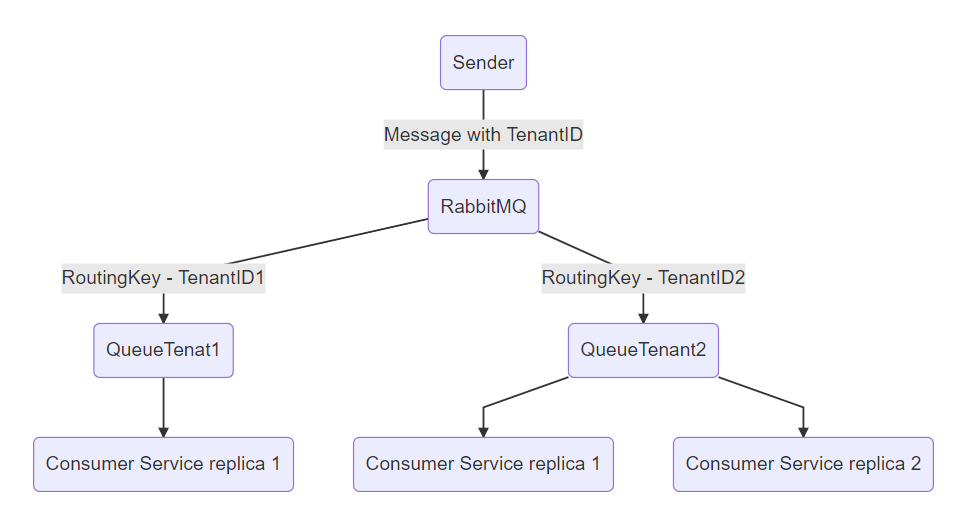Miha Jakovac
.NET & DevOps Engineer | Cloud Specialist | Team Enabler
- CV
- A funny perspective on Software Engineering
- LinkedIn Profile
- GitHub Profile
- MJC.si
- Nomirun
- QAToolKit
My name is Miha and I've been tinkering with computers for some time now. I remember getting Pentium 100 in the late '90s and that's how it all started.
Specialities:
- Azure cloud development
- Devops services and expertise
- Back-end application development
- Enhancing team culture and communication
MassTransit and RabbitMQ routing to tenant-specific consumers on .NET
by Miha J.
Imagine a situation where you have an application that has a multi-tenancy. The application has a service that can run in multiple replicas and is configured for a specific tenant.
You can imagine it something like the diagram below:

- A Sender sends the message with a TenantID to RabbitMQ.
- RabbitMQ routes the message to the queue that is specific for a particular tenant.
- Consumer service picks up a message from the tenant queue and processes it. There can be multiple replicas under one tenant.
So how can we achieve that with MassTransit framework?
I’ve prepared a simple solution on GitHub, where you can download it and run it. Below is just the description of the essential parts of the solution - sending and receiving from the tenant-specific queue.
For sending, we are using MassTransit’s ISendEndpointProvider, which specifies a sending endpoint to consumerName (the last part of the name is a tenantId).
public class Sender
{
private readonly ISendEndpointProvider _sendEndpoint;
public Sender(ISendEndpointProvider sendEndpoint)
{
_sendEndpoint = sendEndpoint;
}
public async Task Publish(MyMessage resp)
{
string consumerName = $"{KebabCaseEndpointNameFormatter.Instance.Consumer<MyConsumer>()}-{resp.TenantId}";
ISendEndpoint endpoint = await _sendEndpoint.GetSendEndpoint(
new Uri($"queue:{consumerName}"));
await endpoint.Send(resp);
}
}
For receiving, we define a consumer, which implements IConsumer<MyMessage>.
public class MyConsumer: IConsumer<MyMessage>
{
public Task Consume(ConsumeContext<MyMessage> context)
{
Console.WriteLine(JsonConvert.SerializeObject(context.Message));
return Task.CompletedTask;
}
}
Also we need to configure the receive endpoint for MassTransit in the Consumer project. This is a configuration for the consumer, where we set the tenantId as a part of the queue name, set the ExchangeType to Direct and set the RoutingKey to the one defined in the configuration.
var queueName = $"{KebabCaseEndpointNameFormatter.Instance.Consumer<MyConsumer>()}-{configuration["TenatId"]}";
configurator.ReceiveEndpoint(queueName, endpoint =>
{
endpoint.ConfigureConsumeTopology = false;
endpoint.Bind<MyMessage>(x =>
{
x.ExchangeType = ExchangeType.Direct;
x.RoutingKey = configuration["TenatId"];
});
endpoint.ConfigureConsumer<MyConsumer>(context);
});
And that’s it. To learn more and try it out, download the GitHub solution and fill in bits and pieces yourself :).
tags: masstransit, - c#, - rabbitmq



